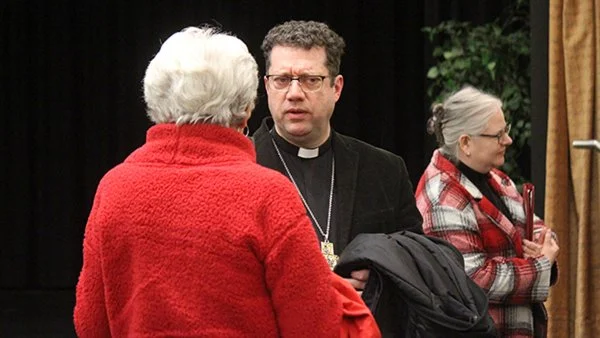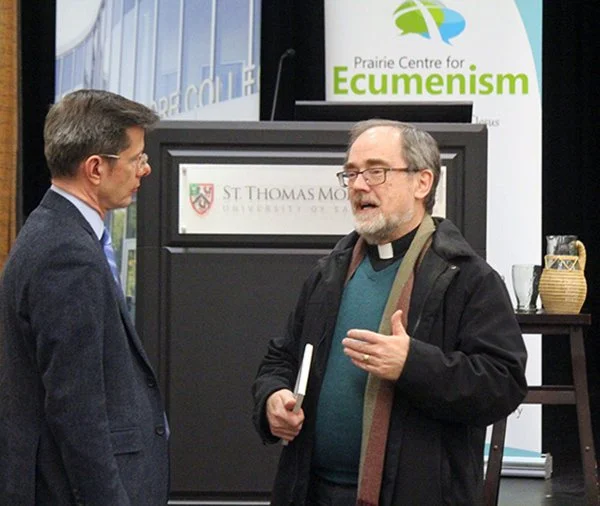- Français
- |
- Booklist
- |
- Week of Prayer
- |
- Links
- Areopagus - a forum for dialogue
- Academic journals
- Acronyms
- Bible tools
- Bibliographies
- Booksellers and publishers
- Churches
- Canadian church headquarters
- Directory of Saskatchewan churches
- Retreat centres
- Saskatchewan church and non-profit agencies
- Ecumenism.net Denominational links
- Anabaptist & Mennonite
- Anglican
- Baptist
- Evangelical
- Independent episcopal
- Lutheran
- Methodist, Wesleyan, and Holiness
- Miscellaneous
- Mormon
- Orthodox (Eastern & Oriental)
- Para-church ministries
- Pentecostal / charismatic
- Presbyterian & Reformed
- Quaker (Society of Friends)
- Roman & Eastern Catholic
- United and uniting
- Documents of Ecumenical Interest
- Ecumenical agencies
- Ecumenical Booklist
- Ecumenical Dialogues
- Glossary
- Human rights
- Inter-religious links
- Justice & peace
- Lectionaries
- Religious news services
- Resource pages
- Search Ecumenism.Net
- |
- Documents
- Ancient & Medieval texts
- Ecumenical Dialogues
- Interreligious
- Anabaptist & Mennonite
- Anglican
- Evangelical
- Lutheran
- Orthodox
- Reformed & Presbyterian
- Roman & Eastern Catholic
- United & Uniting
- Miscellaneous churches
- Canadian Council of Churches (CCC)
- Conference of European Churches (CEC)
- Interchurch Families International Network (IFIN)
- National Council of Churches in Australia (NCCA)
- Lausanne Committee for World Evangelism (LCWE)
- World Council of Churches (WCC)
- Other ecumenical documents
Church traditions
Documents from ecumenical agencies
- |
- Dialogues
- Adventist-Reformed
- African Instituted Churches-Reformed
- Anglican-Lutheran
- Anglican-Orthodox
- Anglican-Reformed
- Anglican-Roman Catholic
- Anglican-United/Uniting
- Baptist-Reformed
- Disciples of Christ-Reformed
- Disciples of Christ-Roman Catholic
- Evangelical-Roman Catholic
- Lutheran-Mennonite
- Lutheran-Mennonite-Roman Catholic
- Lutheran-Reformed
- Lutheran-Roman Catholic
- Mennonite-Reformed
- Mennonite-Roman Catholic
- Methodist-Reformed
- Methodist-Roman Catholic
- Oriental Orthodox-Reformed
- Orthodox-Reformed
- Orthodox-Roman Catholic
- Pentecostal-Reformed
- Prague Consultations
- REC-WARC Consultations
- Roman Catholic-Lutheran-Reformed
- Roman Catholic-Reformed
- Roman Catholic-United Church of Canada
- |
- Quick links
- Canadian Centre for Ecumenism
- Canadian Council of Churches
- Ecumenical Shared Ministries
- Ecumenism in Canada
- Interchurch Families International Network
- International Anglican-Roman Catholic Commission for Unity and Mission
- Kairos: Canadian Ecumenical Justice Initiatives
- North American Academy of Ecumenists
- Prairie Centre for Ecumenism
- Réseau œcuménique justice et paix
- Week of Prayer for Christian Unity
- Women's Interchurch Council of Canada
- World Council of Churches
- |
- Archives
- |
- About us
Break up the log jam on ecumenism, says De Margerie speaker
— Jan. 25, 202325 janv. 2023Clergy must be inculcated in spirit of ecumenism during formation to lead the way
It’s time to break up the log jam on ecumenism, said the featured speaker of the 2023 De Margerie Lectures on Christian Reconciliation and Unity.
The lectures featured the Rt. Rev. Bruce Myers, OGS (Anglican Bishop of Quebec), and were held for the first time in both Regina and Saskatoon last week. The event came during the Week of Prayer for Christian Unity.
The title of his presentation was Ecumenical Log Drivers: Forming Agents of Reconciliation for Church and World.
The De Margerie Lectures are named in honour of Fr. Bernard de Margerie, a priest of the Diocese of Saskatoon who has dedicated his whole life in ministry to the promotion of Christian unity. In this 10th year of the series, the annual event was expanded to offer lectures in both Regina and Saskatoon under the sponsorship of the Leslie and Irene Dubé Chair for Catholic Studies at St. Thomas More College, the Prairie Centre for Ecumenism, the Archdiocese of Regina, and Campion College.
Ecumenism is the concept and principle that Christians who belong to different Christian denominations should work together to develop closer relationships among their churches and promote Christian unity. (See definition, history of ecumenism HERE)
Bishop Myers grew up in the Ottawa Valley, and in studying the issue of ecumenism, the image of the historical log drivers working the river sprung to mind when analyzing the malaise afflicting the ecumenical movement. Decades of great ideas, movement and agreement have been piled up into a logjam of inactivity.
“Though the ecumenical movement has come a long way, it still has a long way to go, still,” he said.
Bishop Myers sees the ecumenical log driver as a kind of agent of mediation, who is able to use their skills to dislodge a decades-old logjam of ecumenical agreements so that they can freely flow down river and be received and processed by the churches and integrated into their life and work at every level.
“Which is, indeed, their intended purpose. Ecumenical agreed statements aren’t supposed to be exercises in theological speculation. They are intended to provide the theological tools necessary for the churches to make more visible their inherent oneness – a unity obscured by the sin of our divisions.”
Bishop Myers said the last half century of ecumenical conversations have been extraordinarily fruitful, except that the agreed statements risk having little life beyond the pages on which they are printed.
He wondered if our avowed commitment to ecumenism risks becoming performative, rather than a meaningful effort.
“A key missing link in the process of ecumenical reception, breathing life into them, putting flesh on their bones, is often ecumenical formation, particularly that of our ordained leadership,” Bishop Myers said.
“All of God’s people are called to walk the way of ecumenism, but in most of our traditions it’s our theologically trained clergy who have a particular responsibility and vocation as teachers of faith in our communities.”
“Therefore, if the faithful who constitute our congregations and parishes are to develop an ecumenical consciousness, committed to growing in unity and mission with their Christian neighbours in other traditions, the chances of that happening are simply better if the clergy serving them have themselves been inculcated with an ecumenical awareness and spirit.”
Both the Wednesday, Jan. 18 lecture at Campion College in Regina, and the Thursday, Jan. 19 lecture at St. Thomas More College in Saskatoon are available to watch on YouTube:
Each presentation was followed by a Question and Answer period.

 Permanent link: ecumenism.net/?p=13222
Permanent link: ecumenism.net/?p=13222
Categories: News • In this article: Bruce Myers, De Margerie Series, ecumenism

 Lien permanente : ecumenism.net/?p=13222
Lien permanente : ecumenism.net/?p=13222
Catégorie : News • Dans cet article : Bruce Myers, De Margerie Series, ecumenism





